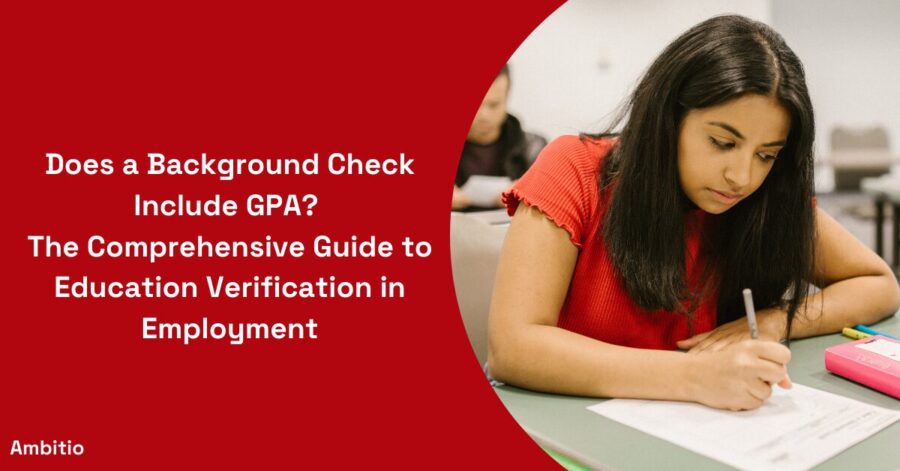12 December 2024
5 minutes read
Does a Background Check Include GPA? The Comprehensive Guide to Education Verification in Employment

Introduction
When applying for jobs, candidates often wonder about the extent of the background check process, especially regarding their academic credentials. A key element of this is the Grade Point Average (GPA).
This comprehensive guide explores whether background checks typically include GPA verification, how employers conduct these checks, and the implications for job applicants.
Understanding the Role of GPA in Employment Background Checks
The Significance of GPA in the Hiring Process
GPA often serves as a measure of a candidate’s academic abilities and work ethic. Employers may view it as an indicator of how well a person might perform in a job, especially in positions that require critical thinking and technical skills.
However, the emphasis on GPA can vary greatly between industries and individual employers.
Industries Where GPA Matters Most
In certain sectors like finance, consulting, and technology, a strong GPA is often seen as a prerequisite. These industries value academic excellence and often have competitive hiring processes.
A high GPA can be a differentiator among a pool of qualified candidates, signaling to employers a candidate’s potential for high performance.
When GPA May Be Overlooked
Conversely, in creative fields or roles that emphasize hands-on experience, GPA might be less critical. Here, portfolios and practical experience often take precedence. Employers in these sectors are more likely to focus on a candidate’s demonstrable skills and achievements rather than their academic record.
The Process of Verifying Academic Credentials
Education verification is a crucial step in many background checks. It involves confirming a candidate’s educational history, including the authenticity of degrees and, at times, GPA.
How Employers Conduct Education Verification
Employers commonly use third-party verification services to authenticate educational records. These agencies contact educational institutions to verify degrees, dates of attendance, and occasionally, GPA.
This process ensures the candidate’s qualifications match their claims, safeguarding the employer against fraudulent educational credentials.
Challenges in GPA Verification
Verifying a candidate’s GPA during the background check process can be complex for several reasons. Here are some key challenges faced in GPA verification:
- Varying Institutional Policies: Different educational institutions have unique policies regarding the disclosure of GPA information. Some may freely provide this information, while others may have strict privacy policies that limit access to such details.
- International Education Systems: When dealing with international candidates, employers often encounter difficulties due to varying grading systems. Understanding and accurately converting GPAs from different countries can be a significant challenge, as there is no universal standard for grading.
- Time Constraints: Verifying GPA can be a time-consuming process, especially if the educational institution is slow to respond or if there are multiple degrees and institutions involved. This can delay the overall hiring process.
- Accuracy of Records: In some cases, educational records may be outdated or incorrectly maintained, leading to potential discrepancies in the reported GPA. Ensuring the accuracy of these records is crucial but can be challenging.
- Privacy Concerns: Candidates may have privacy concerns about sharing detailed academic records. Employers must balance the need for verification with respecting the candidate’s right to privacy.
- Fraudulent Claims: The rise of diploma mills and fraudulent educational claims has made GPA verification more critical. Employers must be vigilant to ensure that the GPA claimed by a candidate is legitimate and not from a dubious source.
- Technological Limitations: Not all institutions have digitized their records, making it difficult to quickly verify GPA information. This reliance on manual checks can add to the complexity and duration of the verification process.
- Interpreting GPA Contextually: A GPA needs to be understood in the context of the institution and the specific program. What constitutes a ‘good’ GPA can vary widely across different educational environments, and employers must be aware of these nuances.
- Legal Constraints: There are legal limitations on how much information an employer can request or verify. Navigating these legal constraints, especially in different jurisdictions, adds another layer of complexity to GPA verification.
- Candidate Consent: In many cases, employers need explicit consent from the candidate to access their academic records. This requirement can sometimes slow down the process if the candidate is slow to provide consent or has reservations about sharing such information.
These challenges highlight the need for a balanced and informed approach to GPA verification in the background check process. Employers must consider these factors to effectively and ethically verify a candidate’s academic credentials.
The Implications of GPA in Employment Screening
The Consequences of Misrepresenting Your GPA
Honesty is crucial in job applications. Misrepresenting your GPA can have severe repercussions, from job offer retraction to long-term career damage.
Legal and Professional Ramifications of Lying About Your GPA
Providing false information on a job application, including inflating your GPA, can be considered fraudulent. If discovered, it can lead to immediate dismissal and harm your professional reputation. In extreme cases, it may even lead to legal action, especially in roles where integrity is paramount.
Case Studies: The Fallout of Falsifying Academic Credentials
There have been notable cases where individuals faced serious consequences for lying about their academic credentials, including high-profile executives and public figures. These stories serve as a stark reminder of the importance of honesty in the job application process.
Best Practices for Including GPA on Your Resume
The decision to include your GPA on your resume should be strategic and consider the relevance to the job and industry.
| Best Practice | Description | Potential Impact |
|---|---|---|
| Include High GPA for Recent Graduates | If you are a recent graduate with a strong GPA (typically 3.5 or higher), it’s beneficial to include it. This is especially true for graduates who have limited work experience, as the GPA can serve as a measure of academic achievement and potential. | Positively highlights academic performance and can compensate for lack of extensive work experience. |
| Omit GPA for Experienced Professionals | For individuals with significant professional experience, the GPA becomes less relevant. In these cases, it’s advisable to omit the GPA and focus on professional achievements and skills. | Shifts the focus to practical skills and professional accomplishments, which are more relevant for experienced candidates. |
| Customize GPA for Relevance | Tailor the inclusion of your GPA based on the job and industry. For example, include it for roles that value academic performance (like consulting or finance) but omit it for roles that prioritize practical skills (like creative fields). | Ensures that your resume is aligned with the expectations and values of the specific industry or role. |
| Use Major GPA if More Relevant | If your overall GPA is not as strong but your major GPA is higher and relevant to the job, consider including only your major GPA. This strategy is particularly useful when your major directly aligns with the job you are applying for. | Highlights academic strength in areas directly relevant to the job, offering a more focused view of your expertise. |
| Be Honest and Accurate | Always provide accurate information. Never inflate or manipulate your GPA. Inaccuracy can lead to serious consequences if discovered during the background check process. | Maintains your integrity and avoids potential negative repercussions of dishonesty. |
| Consider Graduation Date | Generally, if you graduated more than 3-5 years ago, it’s less necessary to include your GPA, unless it’s exceptionally high or specifically requested. As time passes, your professional experience becomes more indicative of your abilities than your academic record. | Keeps the resume current and relevant, focusing on more recent and applicable achievements. |
| Highlight Academic Honors Instead | If you’re hesitant to include your GPA, consider highlighting academic honors or awards as an alternative. This approach allows you to showcase academic achievements without focusing on the specific GPA. | Draws attention to academic accolades, providing a qualitative measure of academic success without specifying GPA. |
Conclusion
In conclusion, while GPA is not universally verified in employment background checks, it plays a significant role in many industries and job applications. The importance of honesty cannot be overstressed; the consequences of misrepresentation are far-reaching.
By understanding how GPA is viewed and verified by employers, candidates can better prepare their applications and navigate the job search process with confidence.
FAQs
Q1: Can a background check reveal my entire academic history?
A background check can reveal your degree and attendance dates. GPA verification is less common and depends on employer interest and institutional policies.
Q2: How long does education verification take?
The process can take anywhere from a few days to a few weeks, depending on the responsiveness of the educational institution and the thoroughness of the check.
Q3: Do all jobs require education verification?
Not all jobs require it, but it’s common in positions where a specific degree or educational background is essential.
Q4: How can I prove my GPA if asked?
You can provide academic transcripts or authorize the educational institution to release this information to the employer or a verification agency.

You can study at top universities worldwide!
Get expert tips and tricks to get into top universities with a free expert session.
Book Your Free 30-Minute Session Now! Book a call now




























